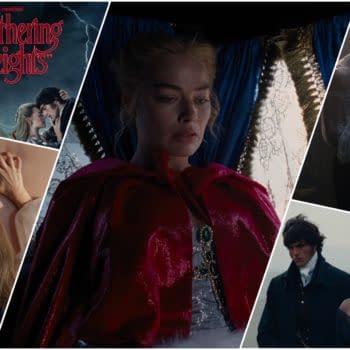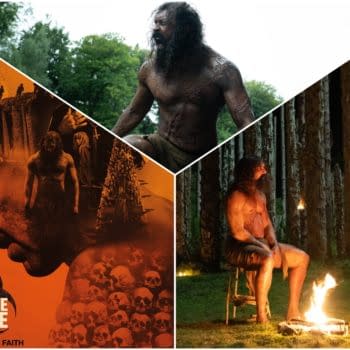Posted in: Movies, Recent Updates | Tagged: alfred hitchcock, casting, entertainment, film, filmmaking, pre-production, Robin Hood Films
Film Schooling: Insider Insights On Indy Filmmaking – Pre-production And Casting (Continued)
By Chris Hood
(This is Part Ten of an ongoing series to help educate aspiring filmmakers on the process of making their first film. Previous articles in this series can be found at BleedingCool.com and MovieIndustry.com)
At the risk of dwelling on this topic a bit too long, I'm devoting one more article to the casting process. In the two previous outings we touched on the importance of getting appropriate "name" talent in proportion to your budget and the decision of whether or not to shoot non-union or union and the complexities of the latter. As a final note on this subject, I'd like to offer up some suggestions for the nuts and bolts of the auditioning process.
Several articles ago I discussed the dangers of shooting in your hometown and having the "local big shot" mentality. I'll assume you're making a "real" film and have at least modest resources at your disposal. So even if you are shooting your movie in some small rural Arkansas town, you're going to look for your principle players in a major market, right? L.A. is the best. New York is second. Find the money to get to one of these cities for a few days and hold auditions. Earmark some funds to bring back a couple/few strong actors to anchor your film. It is money well spent. I assure you. Bad acting is the most blatant give away of having no money invested in your film and giving a distributor or buyer an excuse to offer you as little as possible
Regardless of where you hold your auditions, you have to get the word out. The internet has proven an incredible resource in this respect. Almost everything is done digitally now and there are vast repositories of talent online. The most used of these is Breakdown Services and its sister site Actor's Access. Like many similar sites, producers can post their jobs along with all relevant details and talent will submit. If you're shooting in a major market and/or offering good compensation and travel expenses, you'll get a big response. You'll get to view photos and resumes. In some cases you can see links to personal sites and demo reels. You can easily cast an entire film through this one pair of sites. The difference between the two is that Breakdown has talent submitted by agents and managers whereas Actor's Access is talent who submit themselves. I recommend listing with both.
If it's a union (SAG) show, you'll even get some familiar faces submitted through Breakdown. Generally not the kind of viable "name" talent that helps elevate the salability of your film, but familiar faces aren't a bad thing and some of these people are very solid actors whose work you've grown up watching – they're simply past their peak, but in many cases, still very good actors just wanting to work. Just be careful not to get star-struck and overpay them (see previous article).
For the bigger "names" which I will continue to champion as the single most valuable asset in the film, you'll need to reach out to agents and managers. I touched on this two articles back, so I won't rehash it again here, but one thing you should be aware of is that you won't be able to request these people come out for an audition. Actually, you can request it, but you'll be refused in almost every case and it will evidence just how green you are for even asking. David Fincher can ask Danny Trejo to audition. You and I can't.
When it comes to everyone else, auditions are essential. Find a respectable place to hold them. Don't ever, ever try to do this in a hotel room. I know, it sounds like common sense, but this goes on every day and the producers just can't figure out why people aren't taking them seriously and there are so many no-shows. Aside from the sleazy, casting couch vibe is projects, if a producer can't afford a few hundred bucks for a real audition space, the perception is that they probably don't really have the money for the film anyway…which is usually the case.
A preferred venue is a theaters. Often, even if a play is running, there will be down time or off hours when the management is interested in making a few extra bucks. I've rented space in L.A. for as little as $20 an hour and when you're asking actors to show up at a theatre, you seem legitimate. They feel comfortable. Of course, if you have an office with suitable facilities for something like this, that's fine as well. Under no circumstances should you ever audition in a home regardless of availability. I don't care if your uncle has a $5 million mansion on the beach, it's simply not done. And real actors know it's not done.
Another decision is whether or not to give the prospective talent sides (their lines) in advance or do a cold read, which means they get the material when they arrive and just have a few minute to prepare. I always recommend giving the actors their pages in advance. There's no reason not to. In the real world, they'll have days or even weeks to prepare so allowing them to prep is a more realistic environment. Of course, there may be times when an actor comes in prepared to read for one role and you decide they might fit better elsewhere. Feel free to provide the other lines and give them a few minutes to practice those.
One thing that always impresses me is an actor who memorizes the lines for an audition. It tells me they're serious and professional. They're willing to put in the time. And, of no small account, it tells me they can actually memorize lines. Some people just can't. I don't need to tell you how costly this can end up being on set. I've struggled through actors who were actually talented, but sucked at memorization. I've fired actors who showed up unprepared, though in many cases you've already invested in that character, have burned film on them, and can't afford that luxury so you have to tough it out. It's beyond frustrating when you have to go for a single line at a time by having someone feed it to an actor and have them regurgitate it back for the camera. Cue cards are another tragic elements that are more common place than they should be on a film set. For this reason, I always ask a prospective actor to memorize some of the script, though that is usually requested on a call back (a second audition when the talent is being narrowed down).
If you've never gone through the process before, auditioning can be a very tedious thing. It can take many, many days depending on the project and your casting needs. It sounds exciting on the surface and it is…for about the first hour. The first few times you hear those written words come to life are invigorating and starts to create an even better picture in your mind of what the finished product might look and feel like. After you've done it a little bit, it gets monotonous. After a long bit, it can border on torturous. The worst thing is reading bad actors later in the day when you've already seen dozens or even hundreds of people read the same lines and most have already done it better. Kill me now, please…
I also suggest that you not worry about being too nice. Be polite. Be appreciative. Respect the fact that these people are pursuing a dream, but your time is value and should be treated as such. People will show up that weren't invited. People will want to take up more of your time than you want to give. They'll want you to watch videos on their tablets and check out their websites. They may want to do lines from something other than what you provided. They'll ask to read for other roles that in most cases they are completely inappropriate for. Some will ask you to read their scripts or invite you to a play they're preforming in. Many people are too nice and don't know how to say no and a lot of time can be wasted on these other endeavors.
The more I do this, the tougher I get. I still make a point to treat everyone well and thank them for their time, but there is work to be done. The thing that frustrates me more than any other is an actor who misrepresents him or herself to get in the door. You'll see this, I promise. People will submit headshots that bear almost no resemblance to their current appearance. I've had people walk through the door that look 10 or even 20 years old than the photo I selected. Actors will use an older photo when they were 20, 30 or even 50 pounds lighter. You'll see headshots that were Photoshopped to the point of being nearly criminal. When one of these people walks in the door, when you know immediately that you've been duped, don't be afraid to call them out on it. You don't need to be an ass, but there's nothing wrong with holding up the picture they provided and saying, "This is the person I was expecting to see. This is who I thought might be a good fit for the role. This is just not representative of you. Thank you for your time, but you're just not right for this part."
As you narrow down your favorites, it's not uncommon to have call backs, and sometimes more than one. Occasionally, exactly what you're looking for walks through the door and it is kind of a "magic moment." But most of the time it's a lot of work and a revolving door of various types of talent to find the best fit for a role which may be close to what you had in mind, but different enough to have to acclimate yourself to the changes.
Of paramount importance is honesty. Actors have a right to know exactly what they're getting into as early in the process as humanly possible. This may be before the first audition but at the very latest, when the offer is extended. Nothing creates a toxic environment more than people feeling they've been lied to or fooled. The actor needs to know exactly what the role entails. How long will the shoot be? Is there a chance of running over? Is there a chance pick-ups will be needed down the road. What is the pay? Which of their expenses, if any, will be covered? Is there nudity? A sex scene? Will I be expected to do anything unusual? (swimming with piranhas) Is there anything special I need to prepare for? (ninja training for the fight scenes) Not only should all this be laid out clearly and as early as possible, it should be identified in the contract which, ideally, will be signed as far in advance as practical.
I won't go into the finer points of how to deal with, direct and handle talent and those areas alone could fill volumes. Either you'll have a knack for it, figure it out as you go, or want to kill every actor you come into contact with. Alfred Hitchcock was once called out for saying "actors are cattle." He was quick to make a correction and said, "I never said all actors are cattle; what I said was all actors should be treated like cattle." There will be times when you feel that way. There will be times you love them and times you hate them. There will be times they amaze you and others when they shockingly disappoint you. There will be times when you love and admire their talent and yet despite them as human beings. It's just part of the journey. And, hopefully, that journey will all be worth it in the end.
More to come soon, my friends and creative geniuses. Dream big.
Chris Hood is a writer, producer and director of such films as "Counterpunch" starring Danny Trejo and "Dirty Dealing 3D" with Michael Madsen and C. Thomas Howell. He is also owner of Robin Hood Films, a Las Vegas-based distribution company representing English language films around the world and operates a film blog at MovieIndustry.com. He's also dead sexy. (Mr. Hood denies any involvement in the creation of this mini-bio.)

















